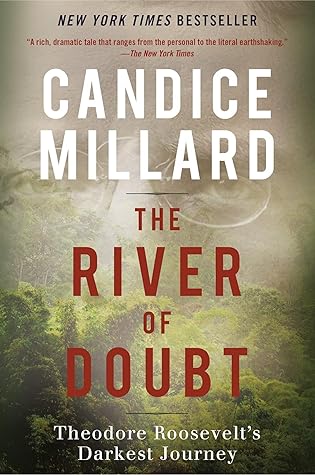More on this book
Community
Kindle Notes & Highlights
Read between
January 3 - January 15, 2023
Throughout his life, Roosevelt had turned to intense physical exertion as a means of overcoming setbacks and sorrow, and he had come to the Amazon in search of that same hard absolution. Deeply frustrated by the bitterness and betrayals of the election contest, he had sought to purge his disappointment by throwing himself headlong against the cruelest trials that nature could offer him.
he slipped into a trancelike delirium, reciting over and over again the opening lines to Samuel Taylor Coleridge’s “Kubla Khan”: “In Xanadu did Kubla Khan a stately pleasure-dome decree. In Xanadu did Kubla Khan a stately pleasure-dome decree. In Xanadu
When confronted with sadness or setbacks that were beyond his power to overcome, Roosevelt instinctively sought out still greater tests, losing himself in punishing physical hardship and danger—experiences that came to shape his personality and inform his most impressive achievements.
“Theodore, you have the mind but you have not the body,” he said, “and without the help of the body the mind cannot go as far as it should. You must make your body. It is hard drudgery to make one’s body, but I know you will do it.” Teedie, then only about eleven years old, flashed his famous teeth, and, accepting the challenge, cried, “I’ll make my body.”
Throughout his adult life, Roosevelt would relish physical exertion, and he would use it not just as a way to keep his body fit and his mind sharp but as his most effective weapon against depression and despair.
“Look out for Theodore,” a doctor traveling with Roosevelt advised Sewall. “He’s not strong, but he’s all grit. He’ll kill himself before he’ll even say he’s tired.”
In The Sea and the Jungle, his classic 1912 book on the Amazon, British author H. M. Tomlinson described meeting some of the men who worked on the railroad.
Approximately ninety million years ago, Gondwanaland, which encompassed Africa, Australia, Antarctica, peninsular India, and South America, also broke apart. The South American landmass drifted westward until it collided with the Nazca Plate, which underlies much of the Pacific Ocean. When the two enormous plates met, the momentum of the impact thrust the western edge of South America over the edge of the Nazca Plate. The result was a continent-long spine of rock and stone that formed what are known today as the Andes Mountains.
Lope de Aguirre, a man whose name would later become practically synonymous in South America with deceit and brutality.
Roosevelt lived during the last days of the golden age of exploration, a time when men and women of science roamed the world, uncovering its geographical secrets at a breathtaking pace and giving rise to bitter international competitions. The year he was born, the earnest young explorer John Hanning Speke, traveling with the famed Orientalist Richard Burton, discovered the source of the White Nile.
A man may be a pleasant companion when you always meet him clad in dry clothes, and certain of substantial meals at regulated intervals, but the same cheery individual may seem a very different person when you are both on half rations, eaten cold, and have been drenched for three days—sleeping from utter exhaustion, cramped and wet.”
ONE OF Roosevelt’s most entrenched beliefs, as a cowboy, a hunter, a soldier, and an explorer, was that the health of one man should never endanger the lives of the rest of the men in his expedition.
Before he even left New York, he had packed in his personal baggage, tucked in among his extra socks and eight pairs of eyeglasses, a small vial that contained a lethal dose of morphine. “I have always made it a practice on such trips to take a bottle of morphine with me. Because one never knows what is going to happen,” he told the journalist Oscar Davis. “I always meant that, if at any time death became inevitable, I would have it over with at once, without going through a long-drawn-out agony from which death was the only relief.”
In The Sea and the Jungle, H. M. Tomlinson complained that the only thing Brazilians saw in their rich rain forests in 1910 was rubber. “It is blasphemous that in such a potentially opulent land the juice of one of its wild trees should be dwelt upon . . . as though it were the sole act of Providence,”
Cajazeira sliced deep into his patient’s leg, releasing a mottled mixture of blood and foul-smelling pus that had collected in the abscess. As the doctor worked to insert a drainage tube, swatting away the legions of piums and borrachudo flies that had been attracted to the stench, Roosevelt did not cry out in pain or utter a word of complaint. “Father’s courage was an inspiration never to be forgotten by any of us,” Kermit would later write.


